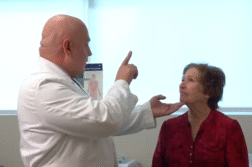LOS ANGELES, Calif. (Ivanhoe Newswire) — The Alzheimer’s Association says 5.8 million people in America have Alzheimer’s disease. That number is projected to hit 14 million by 2050. A doctor in Los Angeles has invented a simple blood test to assess people’s risk of developing the disease years before symptoms show up.
Bailey Slater is 54 and loves life with her family, Dodger and Bixby. Earlier years were a less happy time, when her mother suffered and died from Alzheimer’s. So is Bailey at risk?
“As soon as I learned that there are behavioral changes that I could make in my lifestyle that would lower my risk, I thought I wanted as much information as I can get,” Slater said.
Her search led her to Elroy Vojdani, MD, IFMCP, a Functional Medicine Physician who helped create a blood test to assess risk of developing Alzheimer’s. A vial of blood is separated in a centrifuge, and the immune related components are analyzed in a lab.
“This is the first time that we can get a glimpse at how abnormal interactions between the immune system are affecting the health of the brain,” said Dr. Vojdani.
Slater’s test showed that her brain doesn’t regenerate quickly enough. Dr. Vojdani has her on a plant-based diet and this brain supplement. He says customized diets are 80 percent of the changes needed. He also promotes more exercise, brain games, and sleep.
“They want to know what’s happening between the outside and the inside that could potentially put them at risk for this. This is what the test is perfect for right now,” said Dr. Vojdani.
“For me, it’s huge, because I really lived in fear of getting the disease, and now I finally have hope that I can do something to change my destiny,” Slater shared.
Dr. Vojdani has tested about 40 patients and says the most impaired have the most brain abnormalities. He also says the test is most useful for folks in their mid-40s. Right now, you can only get the test done through a lab called Cyrex in Arizona. Your doctor can order the test, which costs 495 dollars and gives results in three weeks or less. Some clinical trials have begun, but there may not be enough data for an FDA study for ten to fifteen years.
Contributors to this news report include: Wendy Chioji, Field Producer; Rusty Reed, Videographer; Cyndy McGrath, Supervising Producer; Roque Correa, Editor.
To receive a free weekly e-mail on Medical Breakthroughs from Ivanhoe, sign up at: http://www.ivanhoe.com/ftk
MEDICAL BREAKTHROUGHS
RESEARCH SUMMARY
TOPIC: ALZHEIMER’S RISK ASSESSMENT TOOL
REPORT: MB #4592
BACKGROUND: Alzheimer’s is the most common cause of dementia, a general term for memory loss and other cognitive abilities serious enough to interfere with daily life. Alzheimer’s disease accounts for 60 percent to 80 percent of dementia cases. Alzheimer’s is not a normal part of aging. The greatest known risk factor is increasing age, and the majority of people with Alzheimer’s are 65 and older. But Alzheimer’s is not just a disease of old age. Approximately 200,000 Americans under the age of 65 have younger-onset Alzheimer’s disease. Alzheimer’s is a progressive disease, where dementia symptoms gradually worsen over a number of years. In its early stages, memory loss is mild, but with late-stage Alzheimer’s, individuals lose the ability to carry on a conversation and respond to their environment. Alzheimer’s is the sixth leading cause of death in the United States.
(Source: https://www.alz.org/alzheimers-dementia/what-is-alzheimers)
RISK FACTORS: Researchers believe there is not a single cause of Alzheimer’s disease. The disease likely develops from multiple factors, such as genetics, lifestyle and environment. Scientists have identified factors that increase the risk of Alzheimer’s. While some risk factors like age, family history and heredity can’t be changed, emerging evidence suggests there may be other factors we can influence. There is a link between head injury and future risk of dementia. Protect your brain by buckling your seat belt, wearing your helmet when participating in sports, and “fall-proofing” your home. Some of the strongest evidence links brain health to heart health. This connection makes sense, because the brain is nourished by one of the body’s richest networks of blood vessels, and the heart is responsible for pumping blood through these blood vessels to the brain.
(Source: https://www.alz.org/alzheimers-dementia/what-is-alzheimers/causes-and-risk-factors)
NEW RESEARCH: Elroy Vojdani, MD, IFMCP, Functional Medicine and Physician said, “The risk factors that we know concretely for Alzheimer’s are number one a significant family history of Alzheimer’s and then people who have diabetes or high blood pressure are also predisposed to Alzheimer’s. The missing piece of this is the interaction between the immune system and the brain. And we’re learning for the first time in the last five years that that plays another significant piece of the puzzle. We have the tools to assess the other parts of this. This is the first time that we can get a glimpse at how abnormal interactions between the immune system are affecting the health of our brain.
(Source: Elroy Vojdani, MD, IFMCP)
FOR MORE INFORMATION ON THIS REPORT, PLEASE CONTACT:
Elroy Vojdani, MD, IFMCP
If this story or any other Ivanhoe story has impacted your life or prompted you or someone you know to seek or change treatments, please let us know by contacting Marjorie Bekaert Thomas at mthomas@ivanhoe.com




